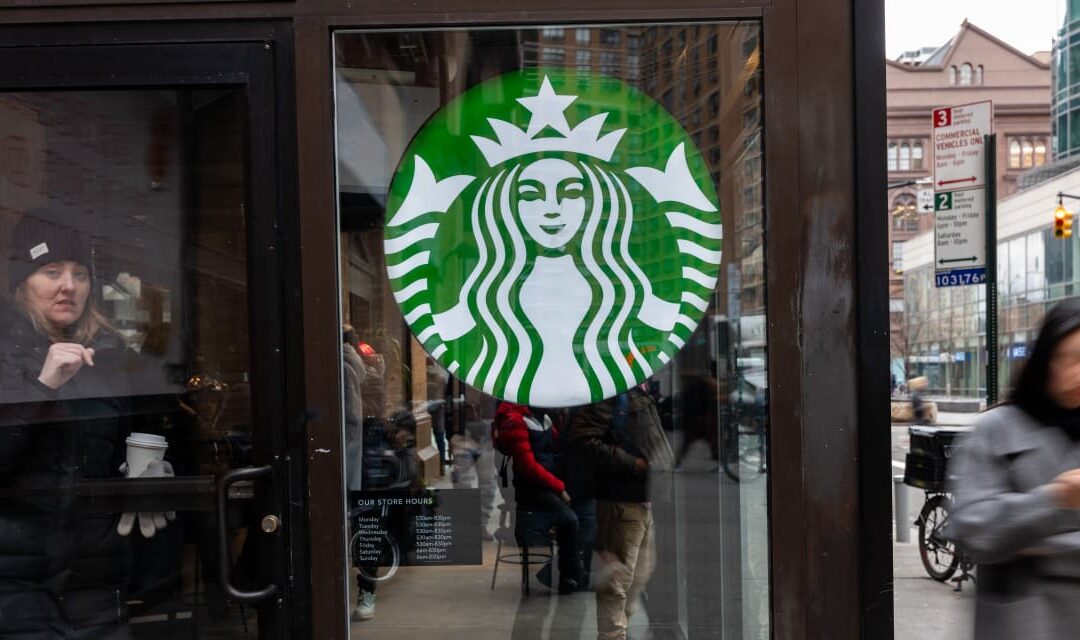During Starbucks Corp.’s earnings call on Tuesday, executives said that the impact from a more cautious consumer in China, the deepening conflict in the Middle East and related consumer boycotts would be fleeting. Afterward, Wall Street was trying to figure out whether to believe them.
During that call, Starbucks
SBUX,
used the word “transitory” at least four times to describe those difficulties, and the coffee chain grew more cautious on its sales outlook for the year. But some analysts weren’t so sure how transitory the issues were.
“Although it is unclear what temporary headwinds they are referring to in the U.S., our interpretation is that boycotts related to an ‘erroneous’ interpretation of SBUX’s stance on the Israeli-Palestinian conflict is to blame,” Wedbush analyst Nick Setyan said in a research note on Wednesday.
“While we believe it is reasonable to attribute some of the recent slowdown to this, we remain concerned that there are larger macro factors at play, and are not convinced the magnitude of the implied [second-half] comp rebound, either in the U.S. or China, can be taken for granted.”
At UBS, analysts said the more conservative outlook on sales, as well as an uptick in global transactions, were positives for Starbucks. But they said “lingering Middle East and U.S. pressures” and an “increasingly uncertain China [market near and possibly long-term] represent potential overhangs.”
Customers and others on social media — both in support of Israel and in support of Palestine — have called for a boycott against Starbucks after the union representing some employees at the chain expressed solidarity with Palestine following Hamas’ attack on Israel in October. That post led to lawsuits, from both Starbucks and the union, and a broader dispute over Starbucks’ stance on the war.
Starbucks said its stores have seen protests, vandalism and employee harassment. The company, in a statement last month, said it condemns “violence, the loss of innocent life and all hate and weaponized speech.”
Hamas militants, in the raid in October, killed 1,200 people, with roughly 240 taken hostage. Israel’s military has killed thousands more in Gaza since.
JPMorgan analysts, meanwhile, downplayed the fallout from the war in the U.S., and said trends had been weak elsewhere, as U.S. consumers continue to grapple with inflation.
“A combination of new food/beverage products, more usage of social media including efforts to drive digital adoption are geared to drive sales,” they said.
“We agree that the negative sentiment around the war should prove mostly transitory, and considering the entire industry has apparently gotten off to a slow January (down 2.3% y/y according to Chase Credit card data) after being up ~2.5% in the December quarter.”
On Tuesday, Starbucks executives said the fighting in the Middle East had hurt business in the region. According to a statement from Starbucks last month, a local business partner runs nearly 2,000 Starbucks stores in the nearly a dozen nations in the Middle East and North Africa. The chain has no stores in Israel.
In the U.S., Starbucks executives on Tuesday said that “misperceptions” about its position on the conflict had weighed on demand. While its most loyal customers haven’t budged, the chain said it took stronger efforts to entice its more occasional customers, and said it saw business rebound in December.
“However, we continue to see further opportunity to welcome back our very occasional customers,” Chief Executive Laxman Narasimhan said during the call on Tuesday. “We feel good about the trajectory over the course of the quarter, but it will take time for our plans to be fully realized.”
In China, executives said Starbucks had been dealing with “a more cautious consumer,” amid tremors in the nation’s economy. And they said they’d been facing more competition from rivals trying to undercut Starbucks on price. Starbucks, during the call, said it wouldn’t take the bait.
“We’re not interested in entering the price war,” Belinda Wong, co-CEO of Starbucks China, said on the call.
She added: “It is our aim to be the best and lead in the premium market, as Lax has said, which Starbucks has pioneered in China 25 years ago. And we will continue to focus on premium experience that is high-quality coffee and human connection.”









